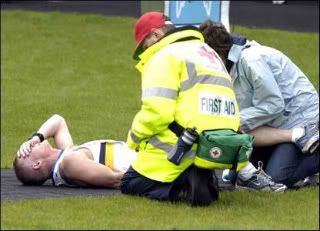"I started when I was 15 years old. What happened to be just a activity soon became one of my passions in life. Overcoming the initial public scorn and disbelief wasn't easy. My blisters popped and I had to limp to the hospital. Solitude is the word that comes to mind every time I remember that part of the trip. I went through several days of upset stomach, weakness and a sense of hopelessness."
--"Jesper," addict.
Recent attempts by lawmakers to ban the drug Salvia have called attention to the little-known drug, a mild hallucinogen. But researchers in Germany fear it may already be too late to stop a different powerful psychotropic, which is far easier to obtain and much cheaper to buy. And chances are, based on current surveys, someone you know has already done it. Maybe even you.
Users call it by it's street name: "Running." It's a drug as old as humanity itself, first introduced into the mainstream by a young Greek soldier named Pheidippides in 490 BC, who tripped all the way from the town of Marathon to Athens, before dying of an overdose. Experts claim that there may be 30 million "runners" in the U.S. alone, accounting for thousands of heart attacks, heat strokes, and knee surgeries a year.

Emergency Workers Tend To Running Addict
"Some people have these really extreme experiences," said Dr. Henning Boecker, the head of the study. Boecker admitted that he himself was a casual user of the drug, saying it left him "completely relaxed" and "cleared his head."
The German researchers found that users of the drug had high endorphin levels in their limbic and prefrontal lobes, contributing to feelings of euphoria and mood changes. Heavy users reported difficulty breathing and feelings of nausea. The study noted that users of the drug often kept on using despite stress fractures and heart attacks suffered during their trip.
And the problem isn't going away. Groups of hardcore "runners" plan on getting together several times this year, in cities and towns across the nation, to use their drug together over a 26.2 mile course. These "marathons" are held in full view of impressionable children.
Krista R. Fakeman, a chemical dependency coordinator at the Madeup Center in Smithtown, an outpatient behavioral health and chemical dependency treatment center, said many teenagers begin using as young as 12.
"We have noticed that adolescents are using it frequently because it is legal and it can’t be detected in urine drug screenings," she said. She said the highs are strongest in the first few minutes.
Ms. Fakeman said that since the beginning of 2006, there has been a 30 to 40 percent increase in "running" by those teens she treats. "It went from something we didn’t even think to screen for to something we now ask all the kids about," she said.
Anthony T. Unrealio, a drug and alcohol counselor in the Nowhereport School District, said he recently began asking students if they ever "ran."
"Several of the kids admitted experimenting with it, and one kid described the high," Mr. Unrealio recalled. "He said it was like an out-of-body experience — like he was in an altered reality state. He said he ran for about 15 minutes."
"Jesper," a self-professed "running junkie," earned the Guinness Book World Record for "running" around the world. He described "mental stress symptoms" that arose from his constant use. "I was about to quit," Jesper said. But there was no escaping the powerful drug. He's planning a new trip from Northern Europe to Cape Town, South Africa this summer.
Several parents organizations have begun pushing legislators for action. But Unrealio doubts the epidemic can be stopped.
"You can cut off their legs, I suppose," he said. "But then you have a whole new set of problems to deal with."
No comments:
Post a Comment